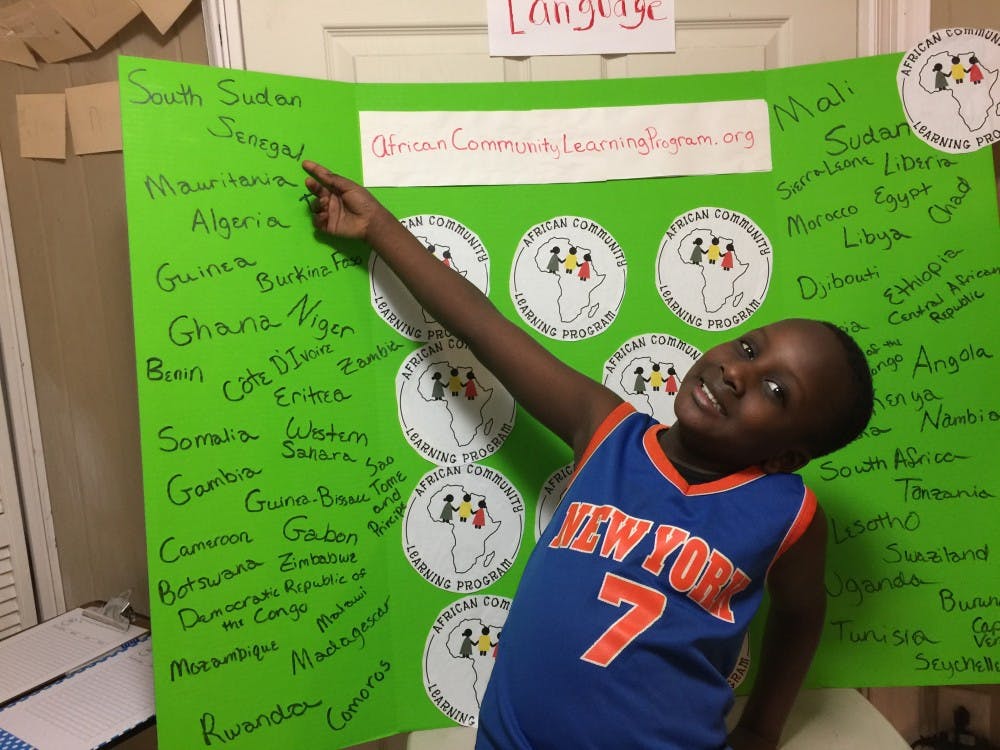Immigrating to a new country has inherent consequences. Aside from more immediate issues like citizenship status, there are less urgent but still crucial problems that deserve more attention. Among these are the problems of learning the language, assimilating into the culture, and succeeding in society.
The African Community Learning Program (ACLP) is “pushing the needle forward” regarding these aspects of immigration, hopefully in a global context. The program is founded and directed by Aminata Sy (C' 19), a 37–year–old non–traditional student majoring in International Relations and minoring in English. Aminata used to be a reporter for the Daily Pennsylvanian and wrote a feature for 34th Street.
The goal of the ACLP is to “educate, connect, empower, and support people of African background” through an after school program that provides free tutoring and mentorship to West Philadelphia students. The first hour is dedicated to homework, while the second hour focuses on people of African background and their identities—who they are, their journey, and so on, using presentations. Children learn about different African countries, languages, and other important aspects of their cultures.
Aminata is a Senegalese–American, and was once a 10th grade high school dropout. She arrived to the U.S. in 2001 to join her husband Abdoul Wane, who she is still married to today.

Aminata reading to a newly arrived 8th grader from Senegal learning English. // Photo provided by Aminata Sy
When her kids started Pre–K in 2007, she volunteered regularly at their school. But she knew that in the future, she wouldn't be able to give them the homework help that they would need. She seriously considered going back to school where she left off when her children’s preschool teacher suggested it. She quit her job as a cashier and went back to school. “The main motivation was helping my kids. I ended up really liking it and I stuck with it,” she said with a laugh.
Being from Senegal, Aminata struggled a lot with cultural adaptation here, with learning English, and with trying to understand the American way of life. “Later on when I began volunteering at my children’s school district, I got to witness many of the struggles that students of African background go through in the school district...they don’t have the support system of people that speak more languages to help them get through their homework and appreciate who they are and their cultural heritage.”
After Aminata saw these problems first hand, it was her husband who encouraged her to start the program. “He has been the chief supporter in all of this. From the idea stage to the implementation stage to the running stage,” Aminata said.
The program now has 15 kids registered, spanning grades one through eight. The tutors are, for the most part, Penn students who volunteer. But finding them has been one of the greatest challenges. “Penn can be a big place not just metaphorically, but also physically big in terms of how disconnected the people you’re trying to reach are. It takes a lot of energy on our end to let different groups know what we’re doing and to generate support from them.”

Photo provided by Aminata Sy
Funding has also been an obstacle. Currently, the ACLP is currently a semifinalists for the Wharton Startup Challenge, which funds undergraduate programs and helps students take their startups to the next level. And for good reason. The progress that the students have made as a result of the ACLP’s curriculum is tangible with significant improvement in the students' grades.
Aminata shared the progress of one student, Dieynaba, a young girl who came from Senegal in late 2017. Though Dieynaba does not speak English, she was able to write an assignment in French, translate it with a tutor’s help, and she read it out to the class "as loud as she could."
"And that almost brought me to tears, to see that progress,” Aminata said.

Photo provided by Aminata Sy
Aminata’s program encourages children of African immigrants to embrace their culture. “Stories about Africa aren’t usually the most inspiring. The curriculum can hopefully help teachers offer a more comprehensive view regarding students of African background or even what it means to be black in a global context,” Aminata said.
She hopes to expand on her curriculum and eventually have it published. In the long run, her ambitions are high, as is her motivation. Aminata hopes to include ESL (English as a Second Language) classes and to have a headquarters where the program is run to implement some of her ideas. Her project also aims at helping the parents of children, or any African, in areas that are very practical, such as helping them learn the English language to take the citizenship test.
Globally, Aminata hopes to reach many people in different places and, most importantly, to show “what Africa is and what it is not." She says, "There is a story within every story. Not just negativity, negativity, negativity.”
Aminata provides an important call to action: “We want support from anyone out there who believes in moving a needle forward. Our organization touches students' lives. Anyone who is interested in sustaining what we’ve started and in promoting our growth, both in Philly and globally as well, the vision is here, the ideas are here, the energy is here, we are ready to go further.”







